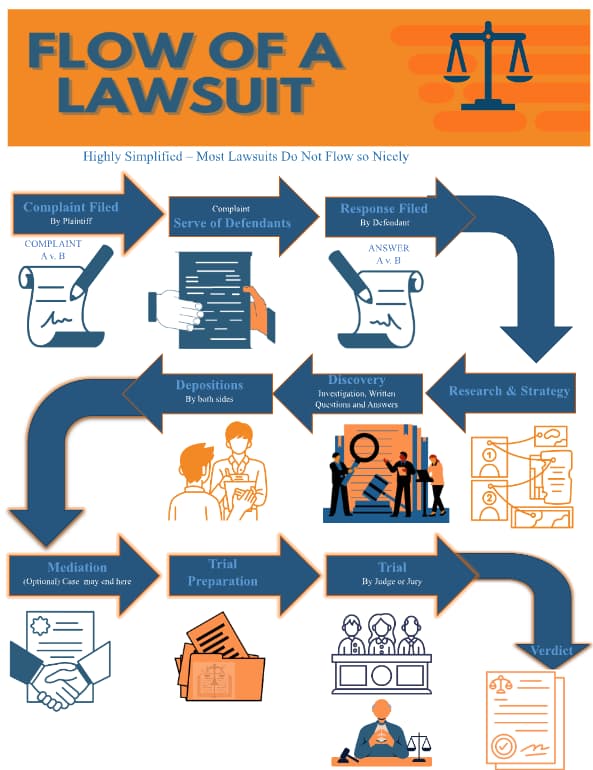Legal disputes—whether civil or criminal—can feel overwhelming, especially when navigating the complexities of the court system. This is where a skilled litigator steps in to advocate for your rights and interests. But what is a litigator, and how do they differ from other types of lawyers?
Key Takeaways
- A litigator is a specialized lawyer who represents clients in legal disputes, both in court and through alternative dispute resolution methods.
- Litigators possess unique skills, including courtroom advocacy, research, and negotiation, making them essential for navigating complex legal challenges.
- They handle a wide range of cases, from civil litigation and commercial disputes to criminal defense and intellectual property matters.
- The litigation process involves multiple stages, including case investigation, discovery, settlement negotiations, trial, and appeals.
- Understanding the role of a litigator can help you choose the right legal representation to protect your rights and interests.
This guide provides a comprehensive look at litigators, exploring their unique skill sets, the types of cases they handle, and the various stages of the litigation process. Whether you’re seeking legal representation or simply want to understand the role of a litigator, this blog will answer your questions and help you navigate the legal landscape with confidence.
Litigator Meaning: What Does a Litigator Do?
A litigator is a type of lawyer who specializes in representing clients in legal disputes that are resolved through the court system or alternative dispute resolution methods such as arbitration or mediation.
What a litigator does involves managing all stages of the litigation process, including initial investigation, filing or defending lawsuits, discovery, trial preparation, courtroom advocacy, and even appeals when necessary.
Key Skills That Make Litigators Unique
Litigators possess a unique set of skills that enable them to advocate for their clients in court effectively. They are expert communicators, able to clearly and persuasively argue their client’s case before a judge and jury. They are also skilled negotiators, capable of reaching favorable settlements with opposing parties when it is in their client’s best interest to do so.
Why Research and Strategy Are Critical for Litigators
In addition to their courtroom skills, litigators must also be meticulous researchers and strategists. They must thoroughly investigate the facts of a case, gathering evidence and interviewing witnesses to build a strong legal argument. They must also be able to anticipate the opposing side’s arguments and develop effective counter-strategies.
Types of Legal Disputes Litigators Handle
Litigators handle a wide range of legal disputes, including civil cases such as contract disputes, personal injury claims, and intellectual property infringement, as well as criminal cases.
They may work for law firms, corporations, government agencies, or non-profit organizations, and may specialize in a particular area of law such as employment law, securities law, or environmental law.
A skilled litigator can be an invaluable ally in the legal system, whether you are a plaintiff seeking to hold another party accountable for harm done to you, or a defendant fighting to protect your rights and interests.
With their expertise, tenacity, and commitment to justice, litigators play a crucial role in ensuring that the rule of law is upheld and that individuals and organizations are held accountable for their actions.
What’s the Difference Between a Litigator and a Lawyer?
Litigators focus specifically on handling legal disputes that involve going to court, while other lawyers may concentrate on transactional work, advisory roles, or non-contentious matters. While all litigators are lawyers, not all lawyers are trained to manage courtroom proceedings or litigation strategy.
Litigation is a specialized area of law involving the resolution of disputes through the court system or alternative methods such as arbitration or mediation. Here are the key ways litigators stand apart from other types of lawyers:
Extensive Courtroom Experience
Litigators are trial lawyers with significant experience representing clients in court. They are skilled at presenting evidence, examining witnesses, and making persuasive legal arguments before a judge or jury.
- In contrast: Lawyers such as transactional attorneys or in-house counsel often have little or no courtroom exposure, focusing instead on drafting contracts, advising clients, or handling negotiations.
Proficiency in the Adversarial Process
Litigators operate within the adversarial legal system, where opposing sides present arguments and evidence to a neutral fact-finder. This requires the ability to think quickly, cross-examine witnesses effectively, and craft compelling arguments under pressure.
- In contrast: Other lawyers may focus on collaborative or advisory roles, such as drafting agreements or advising on compliance, without engaging in courtroom disputes.
Mastery of Procedural Rules
Litigators must deeply understand procedural rules, such as evidence requirements, civil procedure, and appellate guidelines. These rules vary by jurisdiction and are crucial for advancing a client’s case.
- In contrast: Lawyers in non-litigation roles may prioritize substantive law over procedural intricacies, focusing on guiding clients through transactions or regulatory frameworks.
Strategic Decision-Making
Litigators excel in developing and executing strategies to achieve client goals. This includes deciding which claims to pursue, which witnesses to call, and how to present evidence in the most effective way.
- In contrast: Non-litigator lawyers often prioritize providing clients with advice or solutions that prevent disputes, rather than engaging in adversarial tactics.
Handling High-Stakes Cases
Litigators frequently manage cases with significant financial, reputational, or personal consequences for their clients. This requires emotional resilience, focus, and dedication to handle the pressure of high-stakes disputes.
- In contrast: Other lawyers often work in lower-pressure environments, focusing on drafting, advising, or negotiating without the stress of courtroom deadlines.
While all lawyers share a foundation in legal education, litigators bring a unique set of skills and experience to resolving disputes through litigation. From their courtroom expertise to their ability to navigate complex procedural rules, litigators are essential for clients facing adversarial legal challenges. Understanding these differences can help you choose the right legal professional for your specific needs.
Skills and Qualifications of a Litigator
To be an effective litigator, you must possess a unique combination of skills and qualifications that enable you to advocate successfully for your clients in legal disputes.
Analytical and Research Skills
Litigators must be exceptional analysts, capable of reviewing complex legal documents, identifying key issues, and developing effective strategies tailored to each case. Thorough research skills are equally critical, as litigators must investigate case law, statutes, and regulations to build strong arguments. Attention to detail is vital in uncovering crucial facts or inconsistencies that can significantly influence the outcome of a case
Communication and Advocacy Skills
Strong communication is at the heart of effective litigation. Litigators must write clear and persuasive legal briefs, motions, and other documents that communicate their client’s position effectively. Oral advocacy is just as important, as litigators must argue convincingly before judges and juries, cross-examine witnesses, and present evidence in a compelling manner.
Additionally, negotiation skills are essential for resolv
Adaptability and Emotional Intelligence
Legal proceedings can be unpredictable, requiring litigators to think on their feet and adjust strategies in real time. Adaptability ensures they can respond effectively to unexpected developments in court. Emotional intelligence plays a key role in understanding and managing their own emotions while also reading the emotions of judges, juries, and opposing counsel.
These skills allow litigators to navigate high-pressure situations with composure and professionalism
Persistence and Tenacity
Litigation often involves high-stakes cases where the outcome can have significant financial, reputational, or personal consequences for clients. To succeed, litigators must demonstrate persistence and tenacity, advocating fiercely for their clients’ rights even in the face of challenges. Whether preparing for trial, navigating complex discovery processes, or pursuing appeals, their commitment to achieving the best outcome is unwavering.
Educational and Professional Qualifications
Beyond skills, litigators must meet specific educational and licensing requirements. Most litigators hold a bachelor’s degree followed by a law degree from an accredited law school. Passing the bar exam in the state where they practice is mandatory.
Many litigators also pursue additional certifications or training in specialized areas, such as trial advocacy or alternative dispute resolution. Experience in roles like judicial clerkships or associate positions further hones their expertise.
What Are the Responsibilities of a Litigator?
Litigators have a wide range of responsibilities that span the entire litigation process, from the initial investigation of a case to the final resolution. Some of the key responsibilities of a litigator include:
Case assessment
Litigators are responsible for assessing the merits of a case and determining whether it is worth pursuing. This involves reviewing the facts of the case, interviewing potential witnesses, and analyzing relevant legal precedents.
Drafting legal documents
Litigators are responsible for drafting a variety of legal documents, including pleadings, motions, briefs, and discovery requests. These documents must be clear, persuasive, and legally sound.
Discovery
Litigators are responsible for conducting discovery, which is the process of obtaining relevant information and evidence from the opposing party. This may involve issuing subpoenas, conducting depositions, and reviewing documents.
Pretrial preparation
Litigators are responsible for preparing for trial, which includes developing a trial strategy, identifying and preparing witnesses, and creating exhibits and demonstratives.
Trial Advocacy
Litigators are responsible for representing their clients at trial, which involves delivering opening and closing statements, examining and cross-examining witnesses, and making legal arguments before the judge and jury.
Settlement negotiation
Litigators are responsible for negotiating settlements with the opposing party when it is in their client’s best interest to do so. This involves assessing the strengths and weaknesses of the case and developing a negotiation strategy.
Appellate Advocacy
If a case is appealed, litigators are responsible for representing their clients before an appellate court. This involves preparing written briefs and delivering oral arguments before a panel of judges.
Client counseling
Throughout the litigation process, litigators are responsible for counseling their clients and keeping them informed of developments in the case. This involves explaining legal concepts in plain language, providing advice and guidance, and helping clients make informed decisions.
In addition to these specific responsibilities, litigators also have a general duty to zealously advocate for their clients and to uphold the highest standards of professionalism and ethics.
This means putting their clients’ interests first, maintaining client confidentiality, and adhering to the rules of professional conduct governing lawyers.
What Are the Types of Cases Handled by a Litigator?
Litigators handle a wide variety of legal disputes across many different areas of law. Here are some of the most common types of cases that litigators may work on:
Civil Litigation
Civil litigation encompasses a broad range of legal disputes between individuals or organizations, including breach of contract, personal injury, property damage, and intellectual property disputes. Litigators may represent plaintiffs seeking compensation for harm or damages, or defendants fighting against such claims.
Commercial Litigation
Commercial litigation involves legal disputes between businesses, such as breach of contract, partnership disputes, shareholder disputes, and disputes over trade secrets or intellectual property. Litigators may represent companies of all sizes, from small startups to large corporations.
Employment Litigation
Employment litigation involves disputes between employers and employees, such as discrimination, harassment, retaliation, wrongful termination, and wage and hour claims. Litigators may represent either employers or employees in these cases.
Securities Litigation
Securities litigation involves disputes related to the buying and selling of stocks, bonds, and other financial instruments. Litigators may represent investors who have been harmed by fraud or other misconduct, or companies facing such allegations.
Intellectual Property Litigation
Intellectual property litigation involves disputes over patents, trademarks, copyrights, and trade secrets. Litigators may represent companies seeking to protect their intellectual property rights, or defendants accused of infringing on those rights.
Environmental Litigation
Environmental litigation involves disputes related to environmental laws and regulations, such as cases involving pollution, toxic torts, and land use. Litigators may represent individuals or organizations seeking to hold polluters accountable, or defendants fighting against such claims.
Antitrust Litigation
Antitrust litigation involves disputes related to competition law, such as cases involving price-fixing, market allocation, and monopolization. Litigators may represent companies accused of antitrust violations, or plaintiffs seeking damages for harm caused by such violations.
White-Collar Criminal Defense
White-collar criminal defense involves representing individuals or organizations accused of financial crimes such as fraud, embezzlement, insider trading, and money laundering. Litigators in this area must have a deep understanding of complex financial transactions and regulatory schemes.
These are just a few examples of the many types of cases that litigators may handle. Regardless of the specific area of law, litigators bring a unique set of skills and experience to bear in fighting for their client’s rights and interests in the face of legal challenges.
Whether representing a multinational corporation in a complex commercial dispute or an individual in a personal injury case, litigators play a crucial role in the legal system and in the pursuit of justice.
Understanding the Litigation Process: Step-by-Step Guide
Litigation is a complex process that involves many different stages and steps. Here is an overview of the typical process of litigation, from the initial consultation to the final resolution:

Step 1: Consultation
The litigation process begins with an initial consultation between the client and the litigator. During this meeting, the litigator will gather information about the case, assess the merits of the client’s claims or defenses, and provide advice on the best course of action.
Step 2: Investigation
If the litigator determines that the case has merit, they will begin an investigation to gather evidence and build a strong legal argument. This may involve interviewing witnesses, reviewing documents, and consulting with experts.
Step 3: Pleadings
The next step is to file a complaint or answer with the court, depending on whether the client is the plaintiff or the defendant. The complaint sets forth the legal claims and the factual basis for those claims, while the answer responds to the allegations in the complaint.
Step 4: Discovery
After the pleadings are filed, the parties engage in discovery, which is the process of exchanging information and evidence relevant to the case. This may involve depositions (oral testimony under oath), interrogatories (written questions), and requests for production of documents.
Step 5: Pretrial Motions
Before the case goes to trial, the parties may file various pretrial motions, such as motions to dismiss the case, motions for summary judgment (a request for the court to rule in favor of one party without a trial), or motions to exclude certain evidence.
Step 6: Settlement Negotiations
Many cases are resolved through settlement negotiations, where the parties attempt to reach a mutually agreeable resolution without going to trial. Litigators play a key role in these negotiations, advocating for their client’s interests and working to achieve the best possible outcome.
Step 7: Trial
If the case cannot be resolved through settlement, it will proceed to trial. At trial, the litigators present evidence and arguments to a judge or jury, who will then render a decision. Trials can be lengthy and complex, requiring litigators to have strong courtroom skills and the ability to think on their feet.
Step 8: Post-Trial Motions and Appeals
After the trial, the losing party may file post-trial motions, such as a motion for a new trial or a motion for judgment notwithstanding the verdict. If these motions are denied, the losing party may file an appeal to a higher court, seeking to overturn the decision.
Throughout the litigation process, litigators must navigate complex legal and procedural issues, manage client expectations, and adapt to changing circumstances. They must also be skilled negotiators and advocates, able to persuade judges, juries, and opposing counsel of the merits of their client’s case.
Summing Up the Litigation Process
The litigation process is intricate and demands expertise at every step, from the initial consultation to the final appeal. Litigators play a pivotal role in guiding their clients through this journey, leveraging their skills in research, advocacy, negotiation, and strategic decision-making. Whether you’re seeking justice, defending your rights, or resolving a complex legal matter, a skilled litigator ensures your interests are represented and protected throughout the legal process.
Let Kelly Legal Group Advocate for You
Navigating the complexities of litigation is challenging, but you don’t have to face it alone. At Kelly Legal Group, our experienced litigators are committed to providing expert representation tailored to your unique needs. Whether you’re involved in a civil dispute, commercial litigation, or need help with trial advocacy, we’re here to protect your rights and achieve the best possible outcome.
Call us today at (737) 257-6133 or visit kellylegalgroup.com to schedule your consultation. Let us guide you through the legal process with confidence and skill.
Frequently Asked Questions About Litigators
What Is a Litigator?
A litigator is a lawyer who specializes in handling legal disputes through court proceedings or alternative dispute resolution methods like arbitration or mediation. They represent clients in lawsuits and are involved in all phases of the litigation process, from investigation and pleadings to trial and appeal.
What Do Litigators Do?
Litigators manage the full scope of a legal dispute. This includes evaluating the case, gathering evidence, filing legal documents, conducting discovery, representing clients in court, negotiating settlements, and handling appeals if necessary. Their role is to advocate for their clients’ interests and achieve the best possible legal outcome.
What Kind of Lawyer Is a Litigator?
A litigator is a type of trial lawyer who focuses on resolving disputes through adversarial legal processes. While some lawyers may specialize in areas like corporate law or estate planning, litigators work in practice areas that involve conflict resolution, such as civil litigation, commercial litigation, employment law, and criminal defense.
What’s the Difference Between a Litigator and a Lawyer?
All litigators are lawyers, but not all lawyers are litigators. The key difference lies in their focus: litigators represent clients in court and legal disputes, while other lawyers may focus on non-contentious matters like drafting contracts, advising on regulatory compliance, or managing legal transactions. Litigators have specialized courtroom experience and knowledge of litigation procedures.
What Types of Cases Do Litigators Handle?
Litigators handle a wide range of cases, including civil disputes (e.g., breach of contract, personal injury), commercial litigation, employment law issues, securities fraud, intellectual property disputes, environmental claims, antitrust cases, and white-collar criminal defense. Their work spans both individual and corporate representation.
What Are the Key Skills of a Litigator?
Successful litigators are strong in legal research, case strategy, written and oral advocacy, negotiation, and cross-examination. They must also be adaptable, detail-oriented, and emotionally intelligent, especially when managing high-stakes cases or navigating complex legal proceedings.
What Is the Role of a Litigator in the Legal Process?
The litigator’s role is to represent a client through every stage of a legal dispute. This includes investigating claims, filing lawsuits, managing discovery, advocating in court, negotiating settlements, and handling appeals. They ensure their client’s rights are protected and that legal procedures are followed.
What Should I Expect During the Litigation Process?
The litigation process includes several stages: consultation, investigation, pleadings, discovery, pretrial motions, trial, and post-trial appeals. A litigator guides you through each phase, preparing documents, managing court appearances, and negotiating resolutions when appropriate.
When Should I Hire a Litigator?
You should consider hiring a litigator when you are involved in or anticipating a legal dispute that may result in a lawsuit. Whether you are filing a claim or defending against one, a litigator can help you navigate complex legal processes and protect your rights throughout the case.
Is a Trial Lawyer the Same as a Litigator?
Yes, the terms are often used interchangeably. A trial lawyer is essentially a litigator who represents clients in court. However, some litigators may resolve cases through settlements or arbitration without going to trial.






